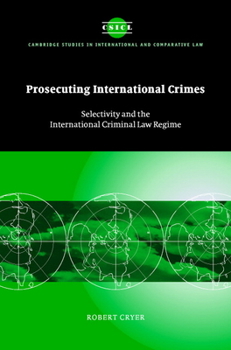Prosecuting International Crimes: Selectivity and the International Criminal Law Regime
(Part of the Cambridge Studies in International and Comparative Law Series)
Select Format
Select Condition 
Book Overview
This 2005 book discusses the legitimacy of the international criminal law regime. It explains the development of the system of international criminal law enforcement in historical context, from antiquity through the Nuremberg and Tokyo Trials, to modern-day prosecutions of atrocities in the former Yugoslavia, Rwanda and Sierra Leone. The modern regime of prosecution of international crimes is evaluated with regard to international relations theory. The book then subjects that regime to critique on the basis of legitimacy and the rule of law, in particular selective enforcement, not only in relation to who is prosecuted, but also the definitions of crimes and principles of liability used when people are prosecuted. It concludes that although selective enforcement is not as powerful as a critique of international criminal law as it was previously, the creation of the International Criminal Court may also have narrowed the substantive rules of international criminal law.
Format:Hardcover
Language:English
ISBN:0521824745
ISBN13:9780521824743
Release Date:July 2005
Publisher:Cambridge University Press
Length:392 Pages
Weight:1.64 lbs.
Dimensions:1.0" x 6.0" x 9.0"
Related Subjects
Air & Space Criminal Law Education & Reference Foreign & International Law Law SpecialtiesCustomer Reviews
0 rating





